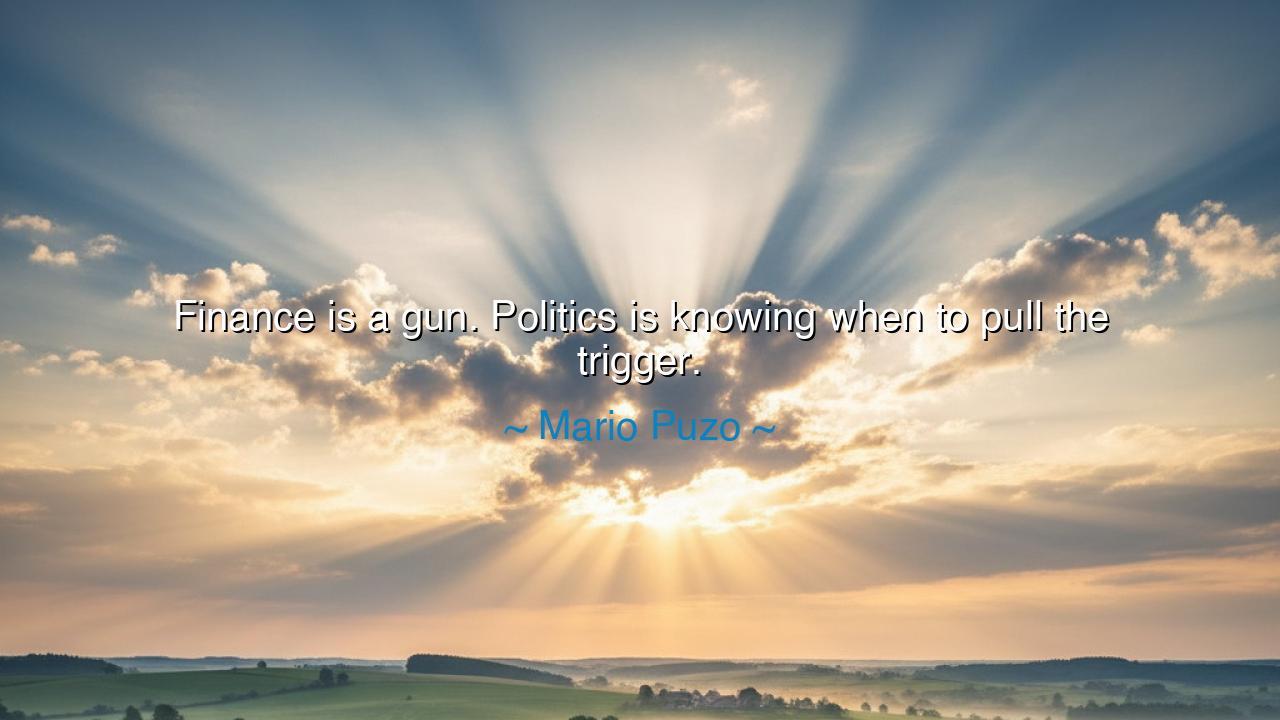
Finance is a gun. Politics is knowing when to pull the trigger.






The words of Mario Puzo, author of The Godfather, strike with the sharpness of steel: “Finance is a gun. Politics is knowing when to pull the trigger.” In this saying, he reveals the marriage of money and power—that wealth provides the weapon, but politics decides how and when it shall be used. For riches without direction are dormant, and politics without resources is powerless. Together they form the engine of history, shaping nations as surely as sword and shield once did.
The ancients too knew this truth. In Athens, the silver mines of Laurium funded the navy that broke the Persian empire at Salamis. Wealth was the gun, but the decision of Themistocles to build ships, rather than hoard treasure, was the political trigger that saved Greece. Thus, from the beginning, finance has been the instrument, and statesmanship the art of choosing when to unleash its force.
Consider the rise of America’s New Deal. In the midst of the Great Depression, Franklin D. Roosevelt held the treasury of a wounded nation. He could have let it lie unused, like a gun left on the table. Instead, through bold political will, he directed its firepower into public works, social programs, and banking reform. Finance alone would have saved nothing; but politics, knowing when and where to act, transformed despair into survival.
Puzo’s metaphor also carries warning. A gun in reckless hands destroys, just as finance misused can corrupt and oppress. To pull the trigger too soon or too often is to bring ruin, yet to hold back forever is to waste potential. The art of politics lies in judgment, in discerning the moment when resources must be released to secure the common good—or, as history too often shows, to secure the ambitions of the few.
Let the generations remember: finance is never neutral; it is power waiting to be wielded. But it is politics—the wisdom or folly of leaders—that determines whether it liberates or enslaves, builds or destroys. Puzo’s words, though born in the world of crime and fiction, speak an eternal truth of nations: wealth may load the chamber, but destiny is shaped by the hand that dares to pull the trigger.






LLinh
I find Puzo’s comparison of finance to a gun and politics to the timing of pulling the trigger both intriguing and problematic. It makes me reflect on how power dynamics are often seen in terms of aggression and control. But shouldn’t politics also involve values, ethics, and responsibility? Can it be that Puzo’s perspective is a bit too focused on manipulation and power, when perhaps politics should be about public good and integrity?
LVLuu Vu
This quote by Mario Puzo resonates with the darker side of both finance and politics, emphasizing the role of power and timing. But is it too cynical? While there’s no doubt that finance and politics can be used for self-serving purposes, isn’t there room for ethical leadership in both? Could Puzo’s quote be highlighting the consequences of power when it’s used recklessly, rather than offering a blueprint for success in these fields?
VHNguyen Van Huong
Puzo’s quote feels like a bold, cynical statement on the intersection of finance and politics. It suggests that both are essentially about control and strategy, but it also implies a certain ruthlessness in their execution. I’m curious about the underlying message here—does this mean that politics is inherently transactional and manipulative, or is Puzo simply emphasizing the importance of timing in making decisions that have far-reaching consequences?
HPDo Hai Phong
This quote brings to mind the cutthroat nature of both finance and politics. The idea that finance is a weapon and politics is about strategic timing speaks to the manipulative aspect of power. However, I wonder: is it always about knowing when to act? Can’t there be moments when restraint and caution in both fields can be just as powerful as pulling the trigger? Is there a risk of over-relying on aggression?
4S4학년2반 s29
Mario Puzo's analogy is both striking and unsettling. Comparing finance to a gun and politics to knowing when to pull the trigger suggests that both can be wielded with great power, but also with potentially dangerous consequences. It makes me wonder, though, does this analogy oversimplify the complexity of both fields? Aren’t there many layers to the relationship between finance and politics that go beyond just timing and control?